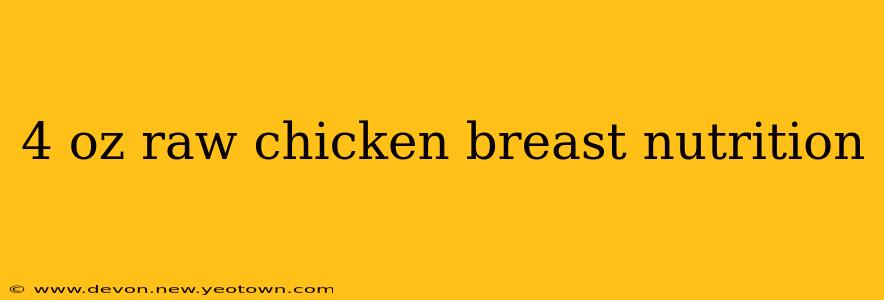Chicken breast. The lean protein powerhouse, the diet staple, the culinary chameleon. It's a pantry and fridge essential for millions, and for good reason. But how much do you really know about the nutritional profile of that 4-ounce raw chicken breast you’re about to grill, bake, or sauté? Let's embark on a journey into the detailed nutritional breakdown, answering common questions along the way.
What are the macronutrients in 4 oz of raw chicken breast?
A 4-ounce (approximately 113 grams) serving of raw chicken breast is a nutritional goldmine, particularly when it comes to protein. It's famously low in fat and carbohydrates, making it a favorite for those watching their weight or following specific diets. Let's break down the macronutrients:
-
Protein: This is where chicken breast shines. You're looking at roughly 30 grams of protein in that 4-ounce serving. Protein is crucial for building and repairing tissues, making enzymes and hormones, and supporting a healthy immune system.
-
Fat: The fat content is remarkably low, typically around 2-3 grams. This relatively small amount contributes to the chicken breast's lean profile, making it an excellent choice for those seeking to manage their fat intake. The fat that is present is mostly unsaturated, which is considered healthier than saturated fat.
-
Carbohydrates: Chicken breast is essentially carb-free. You'll find only trace amounts, negligible enough to be practically ignored in nutritional calculations.
How many calories are in 4 oz of raw chicken breast?
The calorie count for a 4-ounce raw chicken breast typically falls between 130-160 calories. This modest calorie count, combined with its high protein content, makes it a popular choice for weight management strategies. Remember that this can fluctuate slightly depending on the specific chicken and any added seasonings or marinades.
What are the vitamins and minerals in 4 oz of raw chicken breast?
Beyond the macronutrients, chicken breast offers a respectable array of essential vitamins and minerals. While not a superfood in the sense of packing in massive amounts of every nutrient, it contributes to overall dietary needs:
- Niacin (Vitamin B3): Important for energy metabolism and healthy skin.
- Selenium: An antioxidant that protects cells from damage.
- Vitamin B6: Plays a role in brain development and function.
- Phosphorus: Essential for bone health and energy production.
- Potassium: Helps regulate blood pressure.
Does the cooking method affect the nutritional value of chicken breast?
Yes, the way you cook your chicken breast can influence its nutritional content, although the changes aren't usually dramatic. Grilling, baking, or poaching are generally considered healthier options than frying, which adds extra fat and calories. Overcooking, however, can lead to some nutrient loss, so aim for cooking it until it's just done and still juicy.
Is 4 oz of raw chicken breast enough protein for one meal?
For many adults, 4 ounces of chicken breast provides a substantial portion of their daily protein needs, especially when combined with other protein sources throughout the day. However, individual protein requirements vary based on factors like age, activity level, and overall health goals. Consult with a nutritionist or dietitian to determine the optimal protein intake for your specific needs.
Are there any health benefits associated with eating chicken breast?
Chicken breast offers a range of potential health benefits stemming primarily from its high protein and low-fat profile. These include aiding in weight management, supporting muscle growth and repair, and contributing to overall satiety. Its rich nutrient content adds another layer of beneficial elements to your diet.
In conclusion, that seemingly simple 4-ounce raw chicken breast packs a powerful nutritional punch. Understanding its composition allows you to make informed dietary choices, incorporating this lean protein source effectively into your healthy eating plan. Remember to consult with a healthcare professional or registered dietitian for personalized dietary advice.

